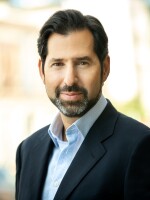Don Hewitt, the voluble CBS News executive producer who was the creative force behind 60 Minutes, died Wednesday morning of pancreatic cancer at his home in Bridgehampton, N.Y. He was 86.
Hewitt was one of the most influential figures in shaping television news. With Pavlovian predictability, millions of Americans have tuned in for decades to watch 60 Minutes. With a blend of exposes and interviews with top newsmakers and cultural stars, Hewitt created a television newsmagazine that reflected his own nature.
"Brash, noisy — Don was right out of The Front Page," says 60 Minutes correspondent Morley Safer, who worked Hewitt from 1970 until Hewitt's retirement in 2004.
"For every thousand crazy ideas he had, he had 10 brilliant ones," Safer says. "The great thing about Don was you could talk him out of the crazy ones. You could never talk him out of the brilliant ones."
Hewitt was a college dropout who served in the Merchant Marine and covered World War II as a reporter before joining CBS News in 1948. That year, Hewitt directed the first American television newscast — and went on to work with Edward R. Murrow. Hewitt also produced the seminal televised Kennedy-Nixon debates of 1960. And he was the first executive producer of Walter Cronkite's half-hour CBS Evening News.
Hewitt helped introduce the teleprompter, on-air captions and the template for television coverage of political conventions. He was pushed to the sidelines in the mid-1960s by new CBS News President Fred Friendly, a far less flashy figure. But while banished from producing the CBS Evening News, Hewitt devised his brightest idea of all.
"We were doing documentaries — CBS Reports, NBC White Paper, ABC Close-Up! And they were all too fussy and too important and too self-important," Hewitt once recalled. "And I said, 'You got to do what Life magazine does. You've got to put a cover with it. You got to put [in] personality.'
"Nobody was interested in the voice of the corporation; they wanted to hear the voice of real people."
That idea became 60 Minutes.
There were missteps along the way, too, notably when Hewitt held back key elements of a story about a whistle-blower from the tobacco industry after the threat of litigation. CBS's owners at the time feared legal action could stymie their proposed sale of the network. In addition, the controlling owners of CBS also owned a tobacco company, Lorillard.
"You learn with any publication or broadcast what the limits are," says former 60 Minutes producer Lowell Bergman, who was the lead reporter on that tobacco story. Bergman is now a professor in the Graduate School of Journalism at the University of California, Berkeley, and a contributing reporter for PBS's Frontline. In this case, Bergman says, "He made the wrong decision. And he decided to side with management."
Hewitt ultimately said he regretted his decision. And at the 60 Minutes offices in Manhattan on Wednesday, only fondness lingered, even as his colleagues acknowledged Hewitt's weaknesses along with his strengths.
Hewitt's protege and successor, Jeff Fager, says Hewitt's brashness obscured his deftness as an editor who improved just about everything he touched, including one of Fager's first pieces for 60 Minutes.
"This was a story about Poland, right after the wall came down and trying capitalism. It wasn't very good," Fager says. "I wasn't sure how he would react. But the lights came on after the screening — and he said, 'Where do you want it, kid? Right between the eyes?' "
Four decades after its creation, 60 Minutes remains the most-watched news show on television — a tribute not only to its famous correspondents, but to the profane television wizard who paced in the control room for so many years.
"He always said that 60 Minutes ruined television, because that was the moment that people realized you could make money in news," Fager recalled Wednesday. 60 Minutes spawned a host of competitors, including Dateline NBC and ABC's 20/20, though none were as successful as the original.
Hewitt said the show's success "had a very negative effect on news, because news, before that, had been a public service," Fager says. "And all of a sudden, 60 Minutes showed, it's not just money you could make — you could make big money."
Copyright 2022 NPR. To see more, visit https://www.npr.org. 9(MDAzMjM2NDYzMDEyMzc1Njk5NjAxNzY3OQ001))






